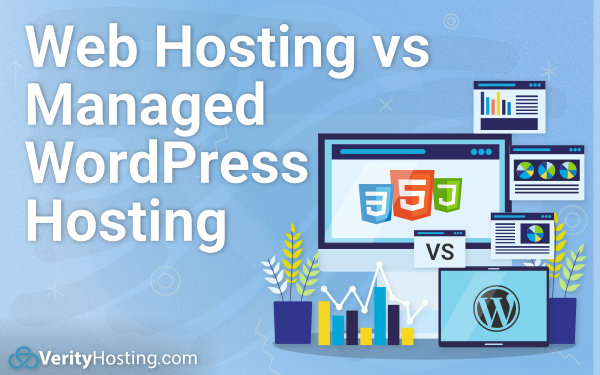
Web Hosting vs Managed WordPress Hosting
Learn what web hosting is and how to choose the best hosting provider for your next project.
Need help managing your small business website? click here
Web hosting is a service that gives websites a place to live on the internet and lets people see them online.
You purchase web hosting from a web hosting company or what is referred to as a web hosting provider.
In this article, you will learn the following:
Web hosting is a service that makes websites accessible on the internet. Websites are comprised of files like text, images, videos, and other media files.
For you to share these files and for people to see them on the internet, you will need a place to store them. This is where web hosting comes in.
Web hosting allows someone to place information on the internet so people can view these files and content.
Web hosting providers allow these files to be downloaded to your computer so you can view them in your internet browser.
So web hosting is a service you buy from a company that allows your website to be viewable online when surfing the internet.
A web hosting provider is a company that provides the computers that store your website files and runs the software that is capable of properly hosting your website online.
The purpose of web hosting is to provide individuals and organizations with a way to make their websites accessible on the internet.
Hosting companies offer server space and allow the website to be seen online. Website owners can store their website files and data on the server and make them available to users on the internet.
The ultimate goal of web hosting is to make it possible for anyone with an internet connection to access a website from anywhere in the world. Without web hosting, websites would not be accessible to users on the internet.
Let's go over in more detail the process of web hosting and how it all works.
When you surf the web, you use an application or program on your computer called an internet browser. An example would be Google Chrome or Firefox.
The internet browser is capable of viewing or displaying websites that are designed in a particular programming language called HTML.
HTML is the main programming language that most websites are built in; however, there are other programming languages that an internet browser can display, but HTML is the primary one.
When surfing the web, you use a search engine like Google.com or Yahoo.com. Search engines like Google.com are companies that index and categorize websites so you can easily find them online.
Search engines allow you to find websites online; however, the individual websites must be stored somewhere. This is where web hosting comes in.
A web hosting provider is a company that stores your website files on their computers called servers. These computers or servers are connected to the internet.
To have your website hosted on one of these computers or servers, you will need to purchase a web Hosting account from a Web Hosting Provider.
There are many types of web hosting providers and different types and levels of hosting accounts. We'll go over in more detail the different types of web hosting later in this article.
For now, understand that for hosting to work, you will need a hosting account from a Web Hosting Provider so your website can be properly viewed on the internet.
To review, web hosting is a service you purchase from a web hosting provider. This service allows you to store your website files written in the programming language HTML on their computers.
These computers are connected to the internet and allow people from all over the world to see these files and, therefore, your website. This process happens in real-time and usually takes only a few seconds.
Web hosting companies offer various Hosting plans and packages. These plans differ in server resources, performance, and features. Website owners can choose a hosting plan that meets their needs and budget. They can upgrade or downgrade their plan as their needs change over time.
Web hosting is essential in making the internet accessible to everyone. It provides a secure and reliable platform for hosting websites. Hosting makes websites available to users across the globe.
There are many different types of web hosting services created for different situations. That is, in web hosting, you can purchase different types based on your website requirements.
Each hosting type is designed to meet the needs of different types of websites and website owners.
You can also purchase web hosting that includes full management, where you have the Hosting provider take care of everything for you. This type of hosting is called managed hosting or fully managed hosting.
Let's take a look at the different types of hosting in more detail.
Hosting types include:
Different Hosting types are used for different purposes. For example, a small basic website with few people visiting it each day may be a good fit for a shared hosting account.
Shared Hosting is usually the cheapest hosting option available; however, it comes with limited support, so you must know how to manage the hosting account and website yourself.
There are also free Hosting options available; however, these host accounts are limited, with almost no support. So you would be on your own when it comes to setup, installation, and maintenance of the hosting account.
There are much better alternatives to free web hosting accounts for just a few dollars a year. We recommend going with a good paid hosting provider to help avoid any hosting problems and frustrations, as you are really on your own with the free web hosting services.
With a paid account, you will have a lot more space and resources available for your website. This will make setting up, configuring, and backing up your website more manageable.
Shared Web Hosting is the most common type of Hosting, where many websites share server resources and space.
This makes it a cost-effective option for website owners who are just starting out or have low to moderate traffic. But, shared Hosting can be slow and unsuitable for high-traffic websites.
Shared Hosting also comes with limited support. So if you are unfamiliar with setting up your own hosting services, you may want to look for a managed or fully managed Hosting provider.
VPS Hosting is where you have a dedicated virtual server. VPS Hosting provides website owners with more resources on a shared server, giving them more control over their hosting environment and the ability to handle higher traffic volumes.
This means you share resources with other customers with their VPS accounts on the same server. However, there are usually fewer people on these servers and more resources to go around.
Another benefit of VPS Hosting is that you can increase your resources if needed. That is, if you need more disc space, processing power, or memory, the Hosting provider can increase it for you.
So VPS hosting allows you to have a virtual private server with more privacy server control and more flexibility in resources if needed.
Dedicated web hosting gives website owners complete control over their hosting environment with their own physical server. This option is more expensive than shared hosting or VPS hosting. Still, it is an excellent option if you are looking for more security and having all the server resources to yourself.
Cloud hosting uses a network of servers to host websites. That is, cloud hosting usually uses more servers than VPS hosting to host even more websites.
The advantage, however, is that there are usually a lot more resources to share and allow you to grow. So if you have a website that is going to grow quickly, cloud web hosting may be the best option.
The downside of cloud hosting can be the cost. As you start to need more resources, you will begin to pay more and more.
This is because, in cloud hosting, you pay for the cost of CPU resources, bandwidth, server space, and memory. This can make cloud hosting a more expensive option for smaller websites.
It is a good idea to look at the pricing for all hosting options but be aware that cloud hosting can come with some unexpected charges.
WordPress hosting is a specialized Hosting type optimized for hosting WordPress websites. This type of Hosting offers features such as automatic updates, WordPress-specific security measures, and enhanced performance. It is ideal for website owners who use WordPress as their website platform.
Managed Web Hosting is a service where the Hosting provider handles all technical aspects of hosting, including server management, updates, and security.
Managed hosting can also include website management, where the provider will regularly do security updates on the website.
Managed web hosting is a good option for small businesses that don't have the technical skills to manage a hosting account properly.
Fully managed Hosting is where the hosting provider takes care of everything for you.
That is, the hosting provider will manage, monitor and maintain the hosting account and all aspects of the website.
Fully Managed Hosting allows you to push all the responsibility back to the hosting provider, so you don't have to worry about any hosting problems or details.
This type of service is ideal for small businesses that want to avoid dealing with any of the hosting setup configurations and ongoing maintenance.
These are just a few of the many types of web hosting plans available. When choosing a hosting type, it's essential to consider factors such as your website's traffic, performance requirements, technical expertise, and budget.
Web hosting and domain names are two separate components that work together to make a website accessible on the internet.
A domain name is an address that people use to access a website, such as www.deltabluesmuseum.org. A domain name is a human-readable name that is converted to a website's IP address.
Web hosting, on the other hand, is a service that lets website files and data be stored and accessed on the internet. It includes the server space and internet access users need to access the website.
To make a website accessible on the internet, both a domain name and web hosting are required. The domain name is used to identify the website, while the web hosting is used to store and distribute the website's files.
No single Hosting solution is ideal for everyone, as each website has unique requirements in terms of performance, scalability, budget, and technical expertise.
For example, a small business with limited website experience may find managed hosting the best option due to its ease of use, much better support, and reliability.
On the other hand, a large e-commerce site with high traffic and complex applications may require dedicated Hosting or managed dedicated hosting for optimal performance and security.
Furthermore, the specific features and resources offered by different Hosting providers can vary widely. So it is important to research and compare different options to find the best fit for your needs.
Factors to consider when choosing a hosting provider include:
Performance: How quickly and reliably does the Hosting provider's server respond to requests?
Scalability: Will the Hosting provider be able to accommodate the growth of your website as your traffic and resource requirements increase?
Security: What measures does the Hosting provider have in place to protect your website and data from security threats?
Technical support: How responsive and helpful is the hosting provider's technical support team in case of issues or questions?
Pricing: What is the cost of the hosting service, and how does it compare to other providers?
Ultimately, the best web hosting provider for your website will depend on your specific needs and priorities.
It's important to thoroughly research and compare different Hosting options to make an informed decision that will provide the best performance, reliability, and support for your website.
Web hosting can cost as little as five dollars a month and up to several thousand dollars or more. For the vast majority of people needing a basic hosting plan, you are looking at around $9 a month on average.
For small businesses, it's a good idea to look for hosting with more support and one that can help get your business online. These hosting plans will run a little more, usually around $25 a month.
For a fully managed business hosting account where the hosting provider does everything for you, these plans will start at around $65 a month and go up from there.
Managed and fully managed hosting are better all-around options for most small businesses. With managed hosting, you put the responsibility of managing, monitoring, and maintaining your website back on the web hosting provider.
Web hosting is a service where you store your website files so that other people on the internet can see them.
As you have learned in this article, the best web hosting solution really depends on your specific needs. By understanding the basics of web hosting, you can make an informed decision and choose the best web hosting solution for your website.
If you would like more information about web hosting, give us a call. We offer fully managed web hosting services where we take care of everything for our clients.
All photos used have been curated by Verity staff

Verity Editorial Staff
The editorial staff at VerityHosting is a team of hosting experts with over 25 years of experience managing, monitoring, and maintaining hosting services for small businesses.
Get helpful small business tips from VerityHosting.com

Learn what web hosting is and how to choose the best hosting provider for your next project.

Learn why SEO professionals use managed hosting for their small business projects.

Learn why shared web hosting may be one of the best hosting solutions for your small business.
Verity Hosting - Providing professional managed hosting services while being focused on helping our clients to build a successful business on the web and on mobile.